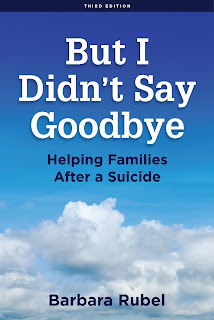Book Review
September is Suicide Prevention Awareness Month, and in our bereavement library here at the funeral home, we have a wonderful book penned by Barbara Rubel entitled, But I Didn't Say Goodbye: For parents and professionals helping child suicide survivors.
But I Didn't Say Goodbye is broken into two major parts. As Barbara Rubel explains in her introduction, part one introduces us to a young boy named Alex, whose father has just completed suicide. Naturally frightened, confused and mourning his father's passing, Alex is asking those in his life questions, including whose at fault for his father's suicide, could he have prevented it, what will happen to his mother and how to tell his friends and classmates about his father's dead. The second part, is geared towards parents and professionals and offers information on setting up a Memorial Fund, and aids to help them in finding survivor support.
What is nice about this book, is the format in which it is written. During part one, which is Alex reflecting back five years ago when he was ten and in the fifth grade, it is broken into nine small chapters of no more than 2 to 5 pages at most. Each chapter starts with Alex speaking directly to whoever is reading his story, as he's explaining what's going on at that particular moment. When he begins to ask questions of the person he is speaking to, these are separated into individual questions, with Alex's question in bold print, and the adult's answer directly underneath his question. Alex also takes the time to tell the reader what he is thinking while asking questions, which helps the reader to understand that this is truly a discussion going on.
At the end of each chapter, there is a Stop to Process page, with a serious of questions, that can help facilitate a deep and meaningful discussion between an adult and the child reading this section of the book. Questions on these page include, "How do I feel about the person who told me that my special person died?" or "How does the word suicide make me feel?" There are also options for the child to explore their feelings in other ways other than talking, such as drawing a picture, making a list, or writing a special poem.
The final chapter of the story is a note written from Alex, and explains how Alex, his sister Debbie, and his mom have continued to celebrate and remember his father. He also speaks about how he went to a support group and what it was like. He ends his note by encouraging everyone to keep reading and researching their feelings to help them continue to cope with their loss.
Part two of the book is for the parents, professionals and caregivers of children dealing with the loss of a loved one from suicide. This section is simply titled Bereavement Referrals, and is a very detailed list of various organizations and other resources for those looking for suicide awareness, prevention and survivor support; death education and grief counseling; crises intervention; addictions; information on depression and suicidology websites. For many of the organizations, Rubel has provided the name and contract information, as well as a detailed description of the organization.
Rubel has chosen to conclude her book by adding an appendix with lists of recommended resources for children, adults and professionals.
In 2020, Ms. Rubel updated her book, and what follows below is the summary of the updated version from Barbara Rubel's website.
But I Didn't say Goodbye: Helping Families After a Suicide tells the story, from the perspective of an eleven-year-old boy, Alex, and his family, as they are rocked by suicide and reeling from the aftermath. Through Alex's eyes, the reader sees the transformation of feelings after going through a suicide from a child's perspective, although he has the wisdom of a bereaved adult.
New to the third edition, each chapter ends with Alex reflecting 10 years later on his experience, introducing family and friends in his recollections. Barbara Rubel has combined our modern academic theories of grieving, and the research that supports those theories, and then translated them into a readable story for anyone bereaved by suicide.
The revised edition is an evidence-informed and contemporary treatment of a devastating form of loss that uses a hypothetical case study to render it in human terms. Through the story, the reader will understand what losing someone to suicide might be like for a family, how to make meaning, and ways to experience personal growth. This book provides guidance and education for clinicians and families to help suicide loss survivors.
Part 1 offers a basic understanding of suicide postvention, complicated grief, mourning theories, and the impact on clinician survivors. Chapters have been updated, based on mourning models and the latest research.
The chapters in Part 2 build upon one another from the day of the suicide to the anniversary. At the end of each chapter, there are follow-up questions to explore in counseling sessions, support groups, therapy sessions, or at home. At the end of each chapter, Alex, at the age of 21, reflects back on how his father's death has changed his life, wounding him, but also helping him to grow.
This award winning book explores a trauma-informed and grief-informed approach to helping those who are traumatically bereaved.
For those who'd like to borrow But I Didn't Say Goodbye: For parents and professionals helping child suicide survivors, you can contact the funeral home and borrow it from our bereavement library.
If you'd like a copy of the newest edition of But I Didn't Say Goodbye, you can purchase a copy by visiting Barbara Rubel's website by clicking here.


No comments:
Post a Comment